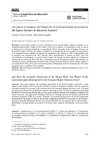Please use this identifier to cite or link to this item:
https://accedacris.ulpgc.es/jspui/handle/10553/55596
| Title: | ¿Se adecúa la normativa de evaluación del Trabajo Fin de Grado a las exigencias del Espacio Europeo de Educación Superior? | Other Titles: | Does the regulatory framework of the Degree Final Year Project fit the assessment approach proposed by the European Higher Education Area? | Authors: | Reyes García, Carmen Isabel Díaz Megolla, Alicia |
UNESCO Clasification: | 580106 Evaluación de alumnos | Keywords: | Evaluación orientada al aprendizaje Tareas de evaluación Participación de los estudiantes Feedback Learning oriented assessment, et al |
Issue Date: | 2017 | Journal: | Revista Complutense de Educacion | Abstract: | Este trabajo analiza el marco normativo de las universidades públicas españolasen la asignatura denominada Trabajo Fin de Grado (TFG) con el objetivo de determinar si éste se adecúa al enfoque de Evaluación Orientada al Aprendizaje (EOA) requerido desde el Espacio Europeo de Educación Superior (EEES). Se realizó un análisis de contenido basado en el análisis de documentos y se emplearon como unidades de análisis las normativas que regulan el TFG. Comprobamos que la normativa de evaluación del TFG presenta cierta aproximación al modelo de EOA pero este acercamiento es insuficiente, ya que los textos legales no recogen de forma global las condiciones mínimas de un sistema de EOA. Por ello, consideramos que los textos legales universitarios no constituyen marcos de referencia adecuados para el diseño de la normativa de las facultades, por lo que es necesario ajustar la información sobre la evaluación del TFG hacia el enfoque que se requiere en la actualidad. This paper analyzes the regulatory framework of the Spanish public universities on the subject called Degree Final Year Project (DFYP) in order to determine whether it fits the approach Learning Oriented-Assessment (LOA) required from the European Higher Education Area. A content analysis was conducted by analyzing documents and using as units of analysis regulations governing the DFYP. We have found that the rules of assessment of DFYP present some alignment with the LOA model. However, this approach is insufficient because as the legal texts do not represent globally the minimum conditions of the LOA model. Therefore, we consider that legal texts are not the appropriate framework for the design of rules for the faculties regarding of the DFYP assessment. So the change is needed to bring the information for the assessment of the DFYP to the approach that is needed today. |
URI: | https://accedacris.ulpgc.es/handle/10553/55596 | ISSN: | 1130-2496 | Source: | Revista complutense de educación [ISSN 1130-2496], v. 28 (4), p. 1285-1302 | URL: | http://dialnet.unirioja.es/servlet/articulo?codigo=6294380 |
| Appears in Collections: | Artículos |
Page view(s)
106
checked on Jan 10, 2026
Download(s)
100
checked on Jan 10, 2026
Google ScholarTM
Check
Share
Export metadata
Items in accedaCRIS are protected by copyright, with all rights reserved, unless otherwise indicated.
